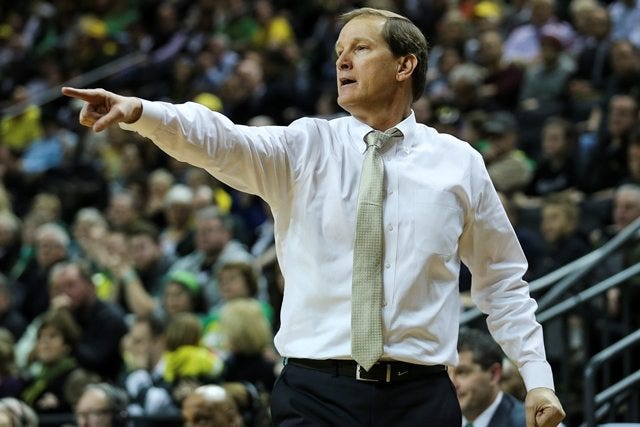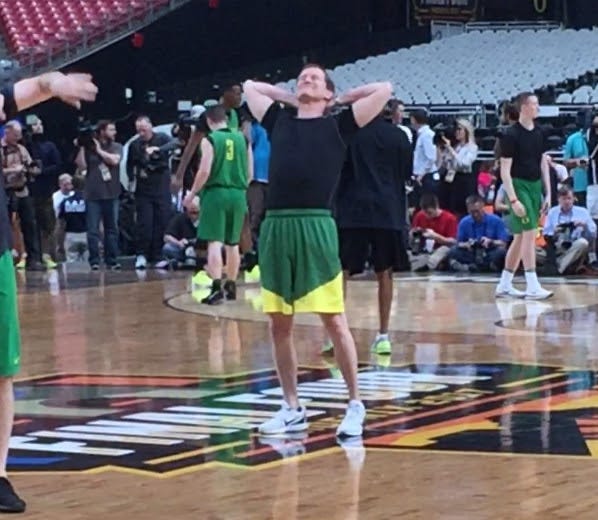‘The genius is in the simplicity of it:’ How Dana Altman slow cooks late-season runs
Oregon has become a beacon of unwavering consistency in an ever-changing college basketball landscape, but it’s in February and March when its coach's teams have made their most rousing marks.
This is a free story from The I-5 Corridor. Learn more about The I-5 Corridor here and consider a subscription for access to all stories and podcasts. Not ready to subscribe but appreciate a good story? We do accept tips.
Dana Altman has made a career out of landing the plane.
He’s been to the NCAA Tournament seven times since taking over Oregon’s men’s basketball program in 2010, winning at least one game in each appearance. He’s been to the Sweet 16 three times, the Elite Eight twice and a Final Four. And while it can often be a turbulent ride in the early stages of a trip to the NCAA Tournament, usually by late-February and March the clouds have parted and the 63-year-old head coach has control.
The hope is that this year is no different. Since starting 6-6 with two embarrassing losses to BYU and Houston, Altman pulled the Ducks out of a spiral with wins in 11 of the team’s last 13 games. And while a loss last week to Cal erased any margin for error, the Ducks still have a sliver of postseason hope if they conclude the season with a sweep of the Arizona and Los Angeles schools, or claim the Pac-12 Tournament in Las Vegas.
A tall task? Certainly. But more than a dozen past and present players, assistant coaches, team managers and grad assistants told The I-5 Corridor that this time of year is right in the coach’s wheelhouse.
“This year, the guys, they haven’t started off the best,” former Oregon guard Will Johnson said. “But they’re picking it up. I tell friends still at Oregon, you just got to give Altman time.”
Why is Altman so good late in the season? Here’s what they all had to say.
There’s no one way to build a college basketball roster, as shown by Altman’s reliance on a varying blend of recruits, JUCO players and high-level transfers over the years. For the Altman teams, the postseason quest begins in the offseason with the meticulous vetting of roster personnel.
The Ducks returned five players in 2022, only two of whom were starters in 2021. Altman bolstered his team with two highly-touted freshmen, three marquee transfers and a JUCO product.
Tony Stubblefield (DePaul head coach, Oregon assistant coach 2010-2021): In this day and age, with all the roster turnover and guys leaving to go to the NBA Draft early, getting transfers, getting JUCO guys, it takes a little bit of time to get everybody to gel on the same page. That's something that Dana Altman is very, very good at.
Mike Mennenga (assistant coach 2014-present): We want guys that are wired a certain way, mentally. We want guys that are wired a certain way when it comes to having a foundation of being a team guy. Those are the cats that come in here and they take ownership.
Paul White (forward 2017-2019): They do a great job of recruiting and looking at who would fit that kind of system and who would be able to defend those kinds of players on the other end of the ball.
Mike Moser (Oregon women’s basketball assistant coach, Oregon forward 2013-2014): He doesn't try to put a circle where a triangle goes. He's always just trying to find the right fit, as opposed to the most talented guy.
Johnathan Loyd (guard 2010-2014): It was just amazing how he got those new guys to trust him and do something different than they did at their last school, and just buy into the program.
Nick Lucenti (guard 2010-2014): You kind of have to leave your ego at the door on a Dana Altman team.
Mennenga: I think the genius is in the simplicity of it. Being able to adjust to the attitudes and the personalities. Every team has its own lifespan, its own individual uniqueness.
Loyd: In November, practices are going to be three hours long, maybe three and a half hours. And you're always going to start with the fundamental things so you can start to learn his philosophies and his lingo.
White: Practice in October, November, it’s like gladiator school. That's where you really decide if you want to do this basketball stuff for real and not.
Mennenga: When it's October and we're just getting going, practices are a little bit longer, they're a little bit more strenuous. Coach is a little bit more boisterous.
White: He’s got one of the loudest voices I've ever been around. You wouldn't expect it.
Loyd: Jerseys have got to be tucked in all the time. You can't have your short strings hanging out. You’ve gotta tuck those in. He always says, ‘Tuck those strings in and look like a ball player!’
Patrick Scully (director of basketball operations at DePaul, Oregon video operations 2013-2021): There's nothing really complex with the practices. Guys buy into the simplicity of what he's coaching. Literally just what he says over and over again, just simple plays and making plays for your teammates.
Mennenga: He'll just start clapping. He’ll clap for like two or three minutes straight. I know when he starts clapping like that before practice, going into a game, that those wheels are turning.
Moser: He comes out, he's clapping his hands and he's got his shorts up around his waist. Different kind of guy style-wise, but he just comes out with the same energy every day.
Scully: A big reason why he has so much success is whether it's after a win or a loss, he’s clapping his hands and saying, ‘Here we go, let's go.’ Over and over again, at practice.
White: He dresses up for practice. He stretches for it. You hear him all over the place.
Loyd: He'll stick his leg up on the scorer's table and put his head between his legs. He always runs in clapping. His motor is always on 110 percent.
Johnson (guard 2017-2021): He's strictly business. He loves the game probably more than anybody I've seen. He's there. He's amped up. He lives and breathes basketball.
White: There's not one day that you walk in that gym and feel like the focus is not on winning.
Steve Thomas (DePaul assistant coach, graduate assistant 2012-2014): He yells, ‘Bend your knees’ a hundred times a day and, ‘Simple plays.’
Loyd: ‘You wouldn't have got that turnover if your knees were bent, we wouldn't have got that foul if your knees were bent.’ That's the answer for everything. When you go watch film, you see yourself and you were standing straight up and down and it's like, ‘Yeah, maybe if I had bent my knees.’ It gets you thinking.
Jonathan Mills (business strategy & analytics employee for the Philadelphia 76ers, Oregon team manager 2013): All of the Altman-ism’s that you hear of, ‘Bend your knees,’ he really believed everything that he said so passionately.
Lucenti: We would make fun of him sometimes because you could almost script how the season was gonna go. Even like practice to practice, you're like, ‘We're gonna do the same things.’ We just stay consistent with what he knows.
Some of Altman’s best Oregon teams have sustained early struggles. Oregon’s Final Four team lost two of its first four games in 2016-17. In 2013-14, the Ducks opened the season with 13 straight wins. Then, after a five-game losing streak threatened to derail their postseason hopes, the Ducks ended the regular season a perfect 8-0 earning a tournament bid. The 2014-15 squad was picked to finished eighth in the Pac-12 by the media, started 3-2 — and still won a game in the NCAA Tournament. And maybe no Altman team got hotter late than in 2018, when Payton Pritchard’s Ducks, who started 4-3, won 10 consecutive games — including the Pac-12 Tournament — to reach the Sweet 16.
Stubblefield: Over the course of time, you're going to see coach and his team continue to get better and better as the season goes along because they believe and trust in exactly what he says.
Thomas: You're mixing all these guys in at the same time and in sports people think, ‘Well, if you have the best guys, then you'll win.’ That's not true. There's plenty of teams that have all those things that don't perform at a high level, and I think coach's ability to get them to see that doing it on their own may not get them as far as if they do it all together [is important].
Mennenga: [Altman] really starts taking a look at the personalities of our players, the skill level of our players, what kind of team we are. And that's where it takes time. Getting everybody on the same page and to understand not only what coach wants, but how can I maximize this role?
Johnson: He knows how to relate to people, and that's one of the more underrated things about being a coach. You have to be able to talk to these guys, communicate with these guys, get these guys to see things about themselves that they may not see.
Scully: He calls the guys all the time just to check in on them and see how their families are doing. Whenever he's talking to a player or anyone, he always ends a conversation with, ‘My phone's always on bud.’
Stubblefield: Grabbing guys one on one, bringing them in, meeting with them, and showing, ‘Hey, maybe some sacrifices for your individual game is in the best interest for the team? Hey, you might have to give a little bit, but it's going to be in the best interest of the team and helping us win the Pac-12 championship and advance to the NCAA tournament down the road.’
Former Oregon center Chris Boucher’s move to the bench is symbolic of such an approach. It also helped pave the way for the Ducks’ run to the Final Four in 2017. Oregon wing Eric Williams Jr.’s move to the sixth man role is a more contemporary example. The Ducks are 11-3 since his move.
Loyd: Altman’s delegating is second to none. Whatever that coach's strong suit is, he lets them be themselves, and he takes advice from all of them. They work so well as a collective unit.
Bryce White (graduate assistant 2019-present): Players, staff, support staff, the janitor, the person at the front door of the arena — they're all respected, and they respect him. He treats them right and I think that, along with the strategy and intellect in regards to the sport, is why he’s the coach he is today.
Johnson: Your role can obviously expand, but you have to prove first that you can excel in the role that he sees best fit… I think over time, it's just drilled into them. Some guys fight it. But eventually they buy in, and then when they buy in, that's when we start to see those late season runs and the teams just looking so much more fluid and cohesive.
(Bryce) White: It's more of the ship analogy, you got 10 players on the ship, and we're all rowing, and if the 11th player doesn't get on, you don't go as fast. But when they get on, we're all together, we're rowing, we're getting to the destination that we choose… After you start winning a couple of games, guys realize that it does work.
It wasn’t long ago that the 2022 Ducks were staring at a 6-6 record. They’re 11-2 since. Despite some debilitating early-season losses and a few head-scratchers of late, Oregon has undoubtedly rounded a corner — as usual, right on time.
Loyd: Now, when you get to February, it's a little more detail oriented because we already know what we're doing and the flow of things. Now, it's about just seeing what plays each player likes and then dialing those plays in for those certain players.
Mennenga: Things are phasing into winning games. Coach is big on individual player development. We leave enough room and juice in the tank where guys have enough energy to stay after practice or come in early before practice and really work on their individual skill sets.
Johnson: The practices are definitely shorter as the season progresses. He understands the value of resting your body and not pushing players over the limit. We go hard, but it's an efficient practice in January.
Mennenga: Coach always reminds the guys that we have the longest season of any college sport.
Lucenti: We'll work on some of the things that we're not doing well, but we're not gonna try and reinvent the wheel. He's like, ‘I know that this works, we just need to get better at certain things.’ And I think that's where he's different from a lot of coaches.
Thomas: It's that emphasis on tweaking a couple things here or there, or scrapping this type of play if we know it's not what works. Knowing your opponent and those types of adjustments that he's making.
Moser: Watch a lot of coaches now, they lose three or four games, they're throwing out their whole playbook. They're already tapping into the transfer portal. Dana’s just not one of those guys.
Loyd: I had never seen an offense like that, so it was a little unorthodox for me. But as the season goes, you start to understand that if you run this with discipline, and you do the little things, that's what opens up the driving lanes.
Scully: [His system is] interchangeable. One through four can start the offense. Offense can start at any of the specific spots on the floor. The five man is kind of the base of it, and the other four are interchangeable. It's got continuity and every action has a reaction… It's something that takes time to really get down and grasp.
(Paul) White: He starts off teaching his basic offense: the spread. But then, according to his teams, he starts to see and gauge his teams and he makes plays, that say, the team last year didn't run. He’s a wizard in that sense, the way that they kind of orchestrate things.
Lucenti: I watched coach strategically get guys in positions where he knew they could go score. You've watched it with these more recent teams, like with Payton Pritchard… He put them in positions where they were going to be successful. And I think that's the biggest thing about coach’s system.
Mills: I'm not the biggest X's and O's guy, but watching that primary set run year after year with different personnel, it doesn't matter whether you're a transfer coming in or you're a high level recruit or a freshman who’s new to the system.
Mennenga: Each team, they’ve got to decide to make it happen. The coach ain't playing, I'm not playing, this is their team… Once a team makes a decision to be good, or the best, you're rolling with the punches from there. Very few teams, I think, regress once they cross over to that point.
Thomas: You can't speed up time. He's been doing it a long time. He's seen it. He's been in a lot of close games. He's won an exorbitant amount of games, and he's lost games, too. He's a learner on both sides of that.
Mennenga: We're down seven with two minutes to go and 15,000 people are yelling at us and telling us we suck, coach is there, ‘Deep breaths fellas, deep breaths.’ He’s steely-eyed. That gives you confidence, because he knows what he's doing.
Thomas: When the game comes down to one or two baskets, he's at the top in the profession of how to create that separation.
In Oregon’s locker room, there’s a whiteboard and on that whiteboard are three words: attitude, energy and connected. The same three words have been there since they were scrawled on the board before the 2019 team — mathematically eliminated from an at-large bid into the NCAA Tournament — made a run to the Sweet 16 after winning the Pac-12 Tournament and earning an automatic bid.
Oregon may well have to pull off a similar feat this season.
Thomas: Everybody's goal in this thing is to play in the NCAA Tournament… He's able to show that what he does works. No one would say they got lucky. You can't get lucky that many years in a row.
Moser: There's a method to the madness, because it seems that there's always some kind of madness before everything clicks.
(Paul) White: Those late season runs, you’ve got to start just figuring out what clicks and what doesn't and unfortunately sometimes you gotta take those losses and bounce back from it… What do we have to lose? Let's really go all out, let's really try and click on all cylinders and be all on the same page.
Mennenga: Do they feel any more confident this is turning because it's happened before and there's a mystique about it? Yeah, maybe there is. Payton Pritchard did it, Dillon Brooks did it, Louis King did it. There’s a lineage there of guys who had a lot of success, and all of a sudden it starts happening for you.
— Shane Hoffmann
Shane Hoffmann is a senior journalism student at the University of Oregon and a regular contributor to The I-5 Corridor. Follow him on Twitter at @shane_hoffmann.
Better yet: Hire him.






Good job, Shane.
This does as much as any story ever at deconstructing Altman's genius. Well done.